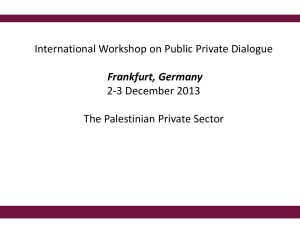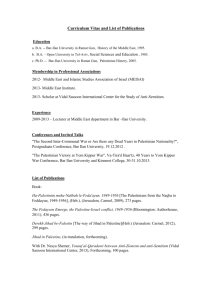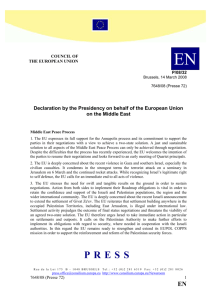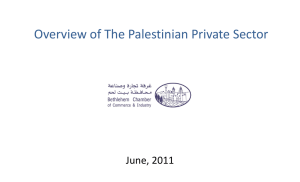Berlin Conference in Support of Palestinian Civil Security & The
advertisement
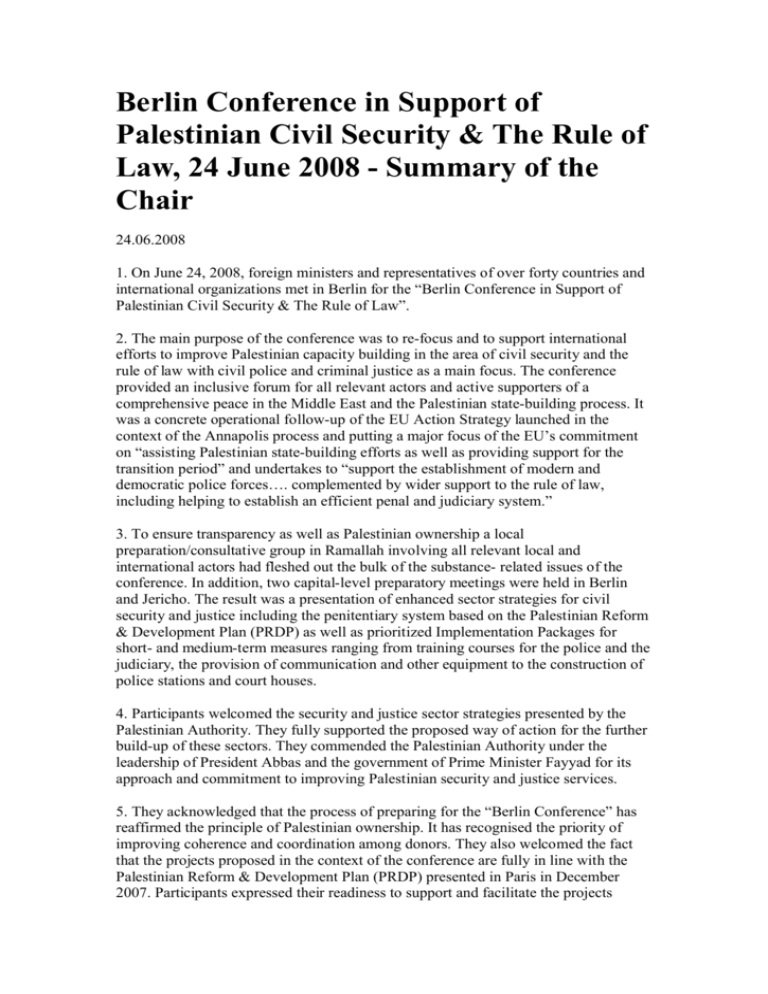
Berlin Conference in Support of Palestinian Civil Security & The Rule of Law, 24 June 2008 - Summary of the Chair 24.06.2008 1. On June 24, 2008, foreign ministers and representatives of over forty countries and international organizations met in Berlin for the “Berlin Conference in Support of Palestinian Civil Security & The Rule of Law”. 2. The main purpose of the conference was to re-focus and to support international efforts to improve Palestinian capacity building in the area of civil security and the rule of law with civil police and criminal justice as a main focus. The conference provided an inclusive forum for all relevant actors and active supporters of a comprehensive peace in the Middle East and the Palestinian state-building process. It was a concrete operational follow-up of the EU Action Strategy launched in the context of the Annapolis process and putting a major focus of the EU’s commitment on “assisting Palestinian state-building efforts as well as providing support for the transition period” and undertakes to “support the establishment of modern and democratic police forces…. complemented by wider support to the rule of law, including helping to establish an efficient penal and judiciary system.” 3. To ensure transparency as well as Palestinian ownership a local preparation/consultative group in Ramallah involving all relevant local and international actors had fleshed out the bulk of the substance- related issues of the conference. In addition, two capital-level preparatory meetings were held in Berlin and Jericho. The result was a presentation of enhanced sector strategies for civil security and justice including the penitentiary system based on the Palestinian Reform & Development Plan (PRDP) as well as prioritized Implementation Packages for short- and medium-term measures ranging from training courses for the police and the judiciary, the provision of communication and other equipment to the construction of police stations and court houses. 4. Participants welcomed the security and justice sector strategies presented by the Palestinian Authority. They fully supported the proposed way of action for the further build-up of these sectors. They commended the Palestinian Authority under the leadership of President Abbas and the government of Prime Minister Fayyad for its approach and commitment to improving Palestinian security and justice services. 5. They acknowledged that the process of preparing for the “Berlin Conference” has reaffirmed the principle of Palestinian ownership. It has recognised the priority of improving coherence and coordination among donors. They also welcomed the fact that the projects proposed in the context of the conference are fully in line with the Palestinian Reform & Development Plan (PRDP) presented in Paris in December 2007. Participants expressed their readiness to support and facilitate the projects proposed in the context of these strategies in terms of financial assistance, political support and practical facilitation. 6. Participants underlined the importance of an encompassing, coordinated and concerted approach to the reform of the Palestinian security sector and welcomed the suggested division of labour between the European Union and the United States with regard to efforts undertaken to help improving services in security and justice. Under this scheme the US and the EU are to assume lead advisory roles regarding the support of the National Security Forces (NSF) / Presidential Guard (PG). and Civil Security (Police and Justice) respectively. 7. Participants expressed their appreciation for the the work and continuous efforts of Quartet Envoy Tony Blair. They welcomed the contribution to Palestinian security and justice sector capacity building by Egypt and Jordan as well as the important early contributions by the Netherlands, Russia, Germany, the United Kingdom and the European Commission. They welcomed the envisaged extension of the EUPOL COPPS Mission with a criminal justice component and acknowledged the contributions of Canada and Norway to EUPOL COPPS. Participants acknowledged the long-standing involvement of the European Commission in the field of Justice. They appreciated the scoping exercise currently undertaken by the EU to determine the overall needs and necessary support in the Palestinian justice sector as a whole and look forward to the presentation of its recommendations. 8. In view of the evolving new dynamics in both the security and justice sector – most obvious through the activities of EUPOL COPPS and the US Security Coordinator – participants expressed their expectation that existing donor-structures under the umbrella of the AHLC receive continued assistance and remain instruments of choice for donor coordination. Participants underscored the need to integrate interested new players into the well-established framework of donor-coordination, notably into the security- and justice-sector working groups. The chairs and co-chairs of both groups will facilitate cooperation among players and make sure that instruments (e.g. the Palestinian Civil Police Development Plan PCPDP) remain open and transparent for possible contribution by all interested parties. 9. Participants stressed the need to quickly implement the projects proposed. They welcomed the nomination of senior level „focal points“[1] by the PA, the State of Israel, the US and EU. These “focal points” are to follow-up in a coordinated effort on the implementation of projects thus ensuring smooth and quick delivery. Participants expect the “focal points” to take a proactive and harmonized approach to resolve issues that might negatively impact on the common goals set. 10. Participants thanked Germany, the Netherlands and the United Kingdom for their co-ordinating efforts in preparation for the Berlin Conference. They appreciated their willingness to continue these efforts within the existing coordination mechanism making use of a local technical follow-up committee. They welcomed the intention of the Netherlands and the United Kingdom to organize a stock-taking meeting in the Palestinian Territories in 2009. [1] PA: MajGen Hazem Attallah; ISR: DDG Rafi Barak; US: USSC LtGen Keith Dayton; EU: EU SR Amb Marc Otte



